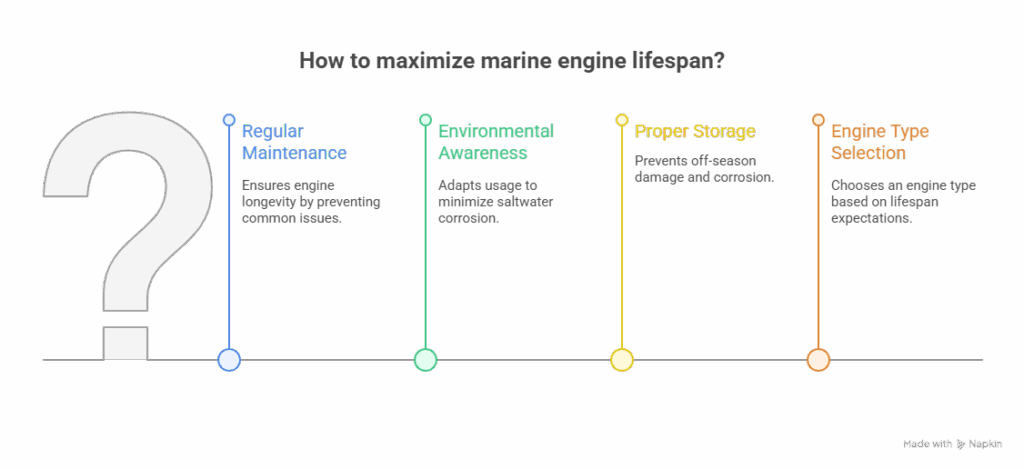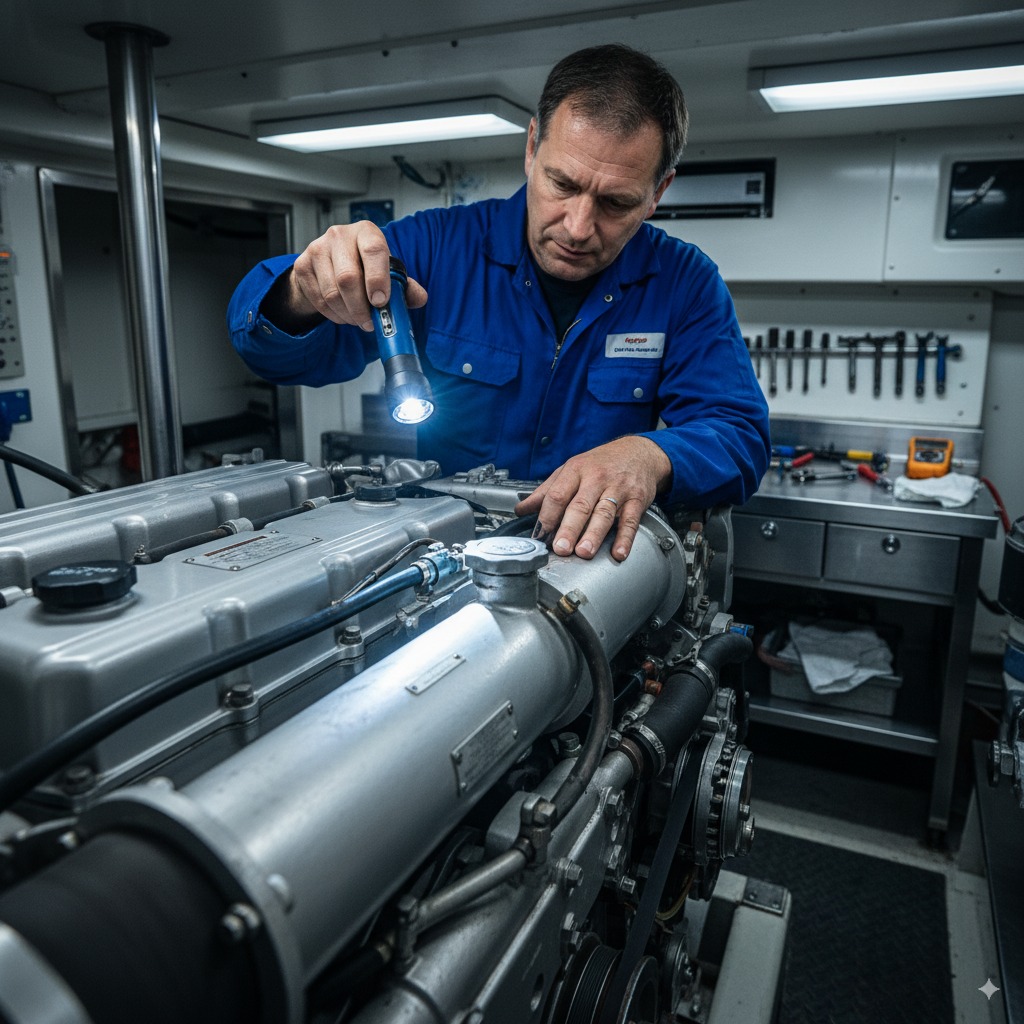“How Long Will It Last?” The Question I Hear Every Day
I’m Alex, and I’ve had my hands covered in grease and saltwater in South Florida marinas for the better part of two decades. The one question I get asked more than any other, whether it’s over a greasy engine block or a cup of coffee at the dock, is this: “What is the life expectancy of a marine engine?”
People expect a simple number, like a car’s odometer reading. 1,500 hours? 5,000 hours? The honest answer I always give them is, “It depends.” I know, that’s not what you want to hear. But it’s the truth.
I’ve seen a brand-new Mercruiser gas inboard die at 800 hours because the owner thought “flushing the engine” was optional in saltwater. On the flip side, I service an old trawler down in the Keys with a Perkins diesel that has over 10,000 hours on it, and that thing purrs like a kitten because its owner, a guy named Ray, treats it like his firstborn child.
So, the real answer to what is the life expectancy of a marine engine isn’t a number—it’s a reflection of how it’s been treated. Your engine’s fate is largely in your hands. This guide is my brain dump of everything I’ve learned about keeping engines alive, so you can spend more time cruising and less time writing checks to guys like me.
Table of Contents
The Big Factors That Decide Your Engine’s Fate
It’s not just about the brand name on the cowling. An engine’s lifespan is a battle between its design and the world you put it in. Here’s what really moves the needle.
Maintenance: The Unsung Hero of Longevity
I’ll say it flat out: the #1 reason engines die prematurely is neglect. Not catastrophic failures, not manufacturing defects—just simple, straightforward neglect. People get busy, they forget, or they just don’t know any better. Answering the question of what is the life expectancy of a marine engine almost always starts with the service records.
Regular oil changes, cooling system flushes, and fuel filter swaps aren’t just “suggestions” in the manual. They’re your engine’s life support system. Skipping a $100 service can easily lead to a $10,000 repair down the road.
The Saltwater Effect and Finding the “Sweet Spot”
An engine living in the Florida Keys has a much harder life than one on a freshwater lake in Minnesota. Salt is relentless. It eats exhaust manifolds, clogs cooling passages, and corrodes electrical connections. The constant fight against corrosion dramatically affects what is the life expectancy of a marine engine.
How you run the engine matters, too. Constantly redlining it is like sprinting a marathon—you’ll burn out fast. Every engine has an RPM “sweet spot” where it’s happiest and most efficient. Running it there, instead of at full throttle, makes a huge difference in wear and tear over the years.

Off-Season Care: Don’t Let It Rot from the Inside
What you do when the boat is sitting is just as important as what you do when it’s running. An engine that sits for months without being properly winterized or stored is a breeding ground for problems. Fuel goes bad, water condenses, and internal parts start to corrode. Proper off-season care is a non-negotiable part of the conversation about what is the life expectancy of a marine engine.
Engine Lifespan by Type: My Real-World Breakdown
Different engines are built for different jobs, and their life expectancies reflect that. Here’s a table I put together based on what I see day-in and day-out in the shop. This isn’t from a brochure; this is from the real world.
| Engine Type | Average Lifespan (Hours) | My Take (The No-BS Version) |
|---|---|---|
| 2-Stroke Outboard (Older) | 500 – 1,500 | The old-school smokers. Fun and simple, but thirsty and don’t last long by modern standards. Finding parts is getting tougher. |
| 4-Stroke Outboard (Modern) | 1,500 – 3,000+ | The standard for most recreational boats now. Quiet, efficient, and reliable if you keep up with maintenance. I’ve seen well-cared-for Yamahas and Suzukis go past 4,000 hours. |
| Inboard Gas Engine | 1,000 – 1,500 | The workhorse of many sport boats and cruisers. They work hard and run at higher RPMs. The biggest killers are water ingestion through the exhaust and overheating. |
| Inboard Diesel Engine | 5,000 – 8,000+ | The king of longevity. Built tough, runs at low RPMs. If you keep the fuel clean and the cooling system happy, these things can seem to run forever. Exceeding 10,000 hours is not uncommon. |
As you can see, anyone asking what is the life expectancy of a marine engine needs to first specify what kind of engine they’re talking about.
My “Can’t-Miss” Maintenance Checklist
If you do nothing else, do this. This is the stuff that prevents 90% of the problems I see.
- Change the Oil and Filter Religiously: Every 100 hours or once a year, no excuses. Clean oil is the cheapest insurance you can buy.
- Flush the Cooling System: If you’re in saltwater, flush with fresh water after every single trip. And check your impeller at least once a season. A failed $50 impeller can cook a $20,000 engine.
- Keep Your Fuel Clean: Water in the fuel is poison. Use a good fuel-water separator and check it often. I tell my clients to replace fuel filters every 300 hours.
Listening to Your Engine: Spotting Trouble Early
Engines talk to you. You just have to learn their language. Catching a problem when it’s a whisper is much better than when it’s a loud bang. The smart owner, when wondering what is the life expectancy of a marine engine, knows that listening for trouble is key.
Watch out for:
- New Noises: Ticking, knocking, or grinding are all bad news.
- Smoke Signals: Blue smoke (burning oil), white smoke (steam/water), or black smoke (too much fuel) all tell a story.
- Performance Dips: If it’s harder to start, stalls, or doesn’t have its old “get-up-and-go,” something is wrong.
DIY vs. Calling Me: Know Your Limits
I’m all for owners getting their hands dirty. Doing your own oil changes, filter swaps, and basic inspections is a great way to save money and get to know your engine.
But know when to put the wrench down and pick up the phone. If you’re dealing with internal engine noises, complex electrical issues, or anything related to the fuel injection system, you can do more harm than good. Understanding what is the life expectancy of a marine engine also means knowing when a professional touch is needed to preserve it.
FAQ: Quick Answers from the Shop Floor
Here are the rapid-fire questions I get all the time.
What’s the number one killer of marine engines?
Easy. Overheating. Usually caused by a failed impeller or a clogged cooling system. It’s almost always preventable.
Are high hours on an engine always a bad thing?
Not at all. I’d take a 2,000-hour engine with meticulous service records over a 200-hour engine that has been sitting and rotting for five years. Consistent use is good for an engine.
Gas vs. Diesel: Which one really lasts longer?
No contest. Diesel. They’re built heavier and run at lower RPMs. If longevity is your top priority when asking what is the life expectancy of a marine engine, diesel is the answer.
Is it worth rebuilding an old marine engine?
It depends. For a classic or a heavy-duty diesel, a rebuild can be a great value. For a common gas engine, the cost of a rebuild can sometimes get close to the price of a new replacement block. You have to do the math.
How much does environment really affect the engine?
Massively. A boat used in saltwater in Florida might have its engine life cut in half compared to the exact same boat used in a freshwater lake up north. This is a huge factor in determining what is the life expectancy of a marine engine.
The Bottom Line: Your Engine’s Future is in Your Hands
So, we come back to the big question: what is the life expectancy of a marine engine? As you’ve seen, it can be 1,000 hours or 10,000 hours. The final number is written not by the manufacturer, but by you, the owner.
Your logbook, your maintenance schedule, and your habits on the water are the true predictors of its lifespan.
If you’re serious about keeping your engine healthy for the long haul, here’s my final advice:
- Make a Maintenance Schedule and Stick to It. Put it in your calendar. No excuses.
- Listen to Your Engine. At the first sign of trouble, investigate. Don’t just turn the radio up.
- Know Your Limits. Do the easy stuff yourself, but have a good, certified mechanic on speed dial for the hard stuff.
- Flush After Every Saltwater Run. Every. Single. Time.
Your engine is the heart of your boat. Treat it well, and it will power countless adventures for years to come. That’s the real answer to what is the life expectancy of a marine engine.
Author Bio
I’m Alex, a 15-year marine technician in South Florida, ABYC-certified. From overhauling tired Mercruisers to keeping high-hour diesels purring, I’ve seen what makes marine engines last and what sends them to an early grave. I’ve fixed them all at marinas like Dinner Key and Bahia Mar, helping boaters get more reliable hours on the water.


Leave a Reply